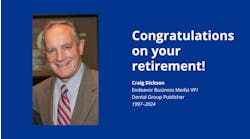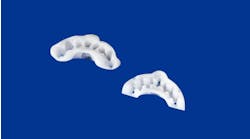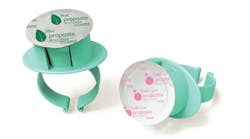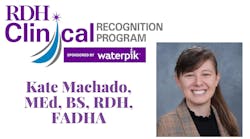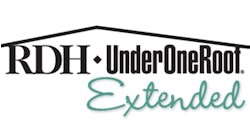BY Lory Laughter, RDH, BS, MS
Life is a continuum of time with many stages along the way. Some stages are a one-time deal, such as milestones, while others occur more than once. They all teach us lessons that are needed to progress and obtain knowledge and skills. These stages are things such as education (either formal or life lessons), and changes in perception and attitudes. A stage that has repeated often in my life the last few years is one of questioning "why?"
Why do we use certain words to describe situations, even if those words are derogatory or outdated? Why do we put ourselves or others down, when in reality we're attempting to rise to the occasion? Why are things that were once so important in our existence suddenly of little consequence? Why do airplane seats create such a productive atmosphere for writing and completing school assignments? These questions apply to our personal lives as well as our professional existence.
----------------------------------------------
Other articles by Lory Laughter
- Changing the routine
- Online job hunting
- Searching for hygienists: An experiment with Internet search terms leads to different perspectives about profession
----------------------------------------------
Our profession started out as a sort of subcategory in dentistry. Perhaps originally seen as a short-lived career for women until a husband could be secured and children appeared, dental hygiene is now often a long career for both women and men. Our role is distinctively different from that of the dentist; yet we still allow ourselves to be viewed as beneath the dentist, and even more disturbing, we allow organized dentistry to control our education, practice settings, paychecks, and essentially the entire profession. Why are we, as a profession, not making a more concentrated effort to change this reality?
At this time, California is the only state where dental hygiene is self-regulated.1 Since the concept has proven to be accomplishable and effective, why haven't more states embraced self-regulation and dental hygiene regulatory boards? Perhaps the delay in achieving the goal of regulating our own profession comes from misinformation and apprehension.
Online discussions reveal that some people believe having a dental hygiene board will make services more costly for patients, or that the cost of licensing will triple and become prohibitive for RDHs. Neither of these has proven true in California. Biannual license costs have risen but not to the level predicted, and I have never heard of an RDH discontinuing practice due to license cost. The cost of oral health care for patients is governed by several factors outside the control of dental hygiene. A decrease in benefits offered or an increase in fees from the dentist is more likely to impact the cost of health care than a self-regulated profession.
Self-regulation should, in my opinion, lead to the ability of RDHs to practice wherever the need arises.2 Whether this be in private practice with a dental team, in schools, in long-term care facilities, or in the residences of homebound patients, care can be delivered where and when it is needed. Call it independent practice, alternative practice, or even dental hygiene practice, there's no reason preventive care is limited to the oversight of a dentist. Referral to a dentist for restorative needs could easily happen, just as a dentist could refer a patient to an RDH for preventive care. Our roles are different, but our goals are the same. Our focus must be appropriate delivery of health care.
Dental hygienists are very active on social media, yet we seem oblivious to the power this opportunity provides. Why are we using it as a platform for complaining when we could be using it as an outlet for change? Fifteen years ago there was no easy method for gathering thousands of RDHs together quickly with little or no cost. By putting fear aside and discussing issues from an unemotional and logical stance, action plans can be developed and implemented with support from all points on the map. Imagine the power of approaching legislation with the support of thousands. Just think of the letters and phone calls possible by engaging colleagues and the public to address issues important to our profession.3 The ability to enact change is right at our keyboards, if we're brave enough to make it happen.
I challenge each of you to sit back and ask "why?" Why are we less than amazed by our profession? Why are we discontent? Legitimate answers will come to the surface and allow for brainstorming, discussion, and ultimately action leading to change. It does not make sense to continue complaining with no plan for success. Success will not happen in the presence of fear. Make it a goal to question often, and make it a plan to act. Act with purpose, strength, and determination. Answers are out there. Are you brave enough to seek them? RDH
Websites referred to in this article
1. dhcc.ca.gov
2. psychologydictionary.org/self-regulation/
3. facebook.com/groups/716210495128311/
Lory Laughter, RDH, BS, MS practices clinically in Napa, Calif. She is owner of Dental IQ, a business responsible for the Annual Napa Dental Experience. Lory combines her love for travel with speaking nationally on a variety of topics. She is also a part-time educator or consultant for American Eagle, Livionex, and Nuvora. She can be contacted at [email protected].


